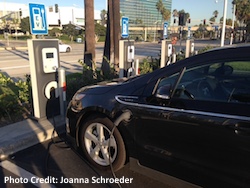Millions of people could be suffering from “range anxiety” a condition that keeps consumers from purchasing electric vehicles for fear of becoming stranded with an empty battery. A new study published in Human Factors addresses range anxiety and aims to explain what it is, and determine whether putting a consumer in a battery electric vehicle (BEV) to drive would reduce or eliminate the fear.
In “Understanding the Impact of Electric Vehicle Driving Experience on Range Anxiety,” Rauh and fellow researchers Thomas Franke and Josef Krems asked 24 experienced and inexperienced BEV users to drive a test route through country roads, in villages, and on the German Autobahn. To increase range stress, participants were told that because of an unexpected technical problem, the BEV was not fully charged.
 “Range anxiety is a popular topic in the field of electric vehicles, and is frequently named as a key barrier for widespread adoption of BEVs,” said coauthor Nadine Rauh, a research assistant in the Department of Cognitive and Engineering Psychology at Germany’s Technische Universität Chemnitz. “We strongly believe that a better understanding of the phenomenon of range anxiety can help us to find ways of enhancing user experience in BEV driving, thereby increasing acceptance of this type of alternative vehicle.”
“Range anxiety is a popular topic in the field of electric vehicles, and is frequently named as a key barrier for widespread adoption of BEVs,” said coauthor Nadine Rauh, a research assistant in the Department of Cognitive and Engineering Psychology at Germany’s Technische Universität Chemnitz. “We strongly believe that a better understanding of the phenomenon of range anxiety can help us to find ways of enhancing user experience in BEV driving, thereby increasing acceptance of this type of alternative vehicle.”
The authors found when the vehicle’s display showed that the remaining range was less than the anticipated trip length, experienced BEV drivers exhibited significantly less anxiety than did those who were unfamiliar with electric cars. The researchers caution that further study is needed to determine what other variables play a role in decreasing range anxiety.
“Drivers who are new to BEVs can experience a lot of stress, but as time goes by they will become more confident in both the BEV’s range and in their own abilities to manage any situations that may arise,” added Franke, a postdoctoral researcher at Technische Universität Chemnitz. “Despite advances in technology that will allow for a longer range, human factors research will remain an important tool for helping to design sustainable and user-friendly electric mobility systems.”

